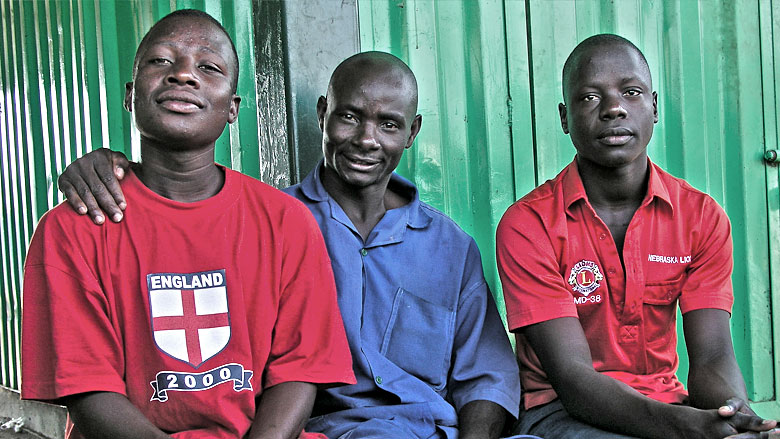Youth unemployment affects 73 million youth around the world. Each year the World Bank Group Youth Innovation Fund, a Youth-to-Youth flagship program, grants funding up to $10,000 for the implementation of innovative project ideas by individual young staffers or small teams. One of this year’s winners is Connect to Implement Development (C2iDev). The project’s goal is to tackle youth unemployment by empowering young people to translate their ideas into jobs. The team behind the project aim to help equip youth who may not have the opportunities, connections or expertise they need to take their business ideas to the next level.
The C2iDev team is currently focusing on Uganda, where youth account for 77 percent of the population and more than 60 percent of the unemployed. According to the 2010 World Bank Uganda Assistance Strategy, nearly 400,000 youth enter the labor force annually and it is critical to support them in their transition to employment in the wage and non-wage sectors.
This emphasis on employment for youth is not only an acute policy issue for Uganda and other emerging economies, but having jobs also lets young people gain more power as consumers, investors and change makers in their own countries. In turn, youth employment also motivates governments and the private sector to focus on innovation and developing competitive advantages.
Addressing gender inequality was also a very important factor for the project. Young Ugandan females are twice as likely to be unemployed than males, and therefore was considered to be a prime indicator to kick-start a youth entrepreneurship program in Uganda.
Through a competitive application process, 27 select youth between ages 18-30, were funded by C2iDev to receive intensive training in market analysis, financial planning, and business plan development to learn how to transform their burgeoning business ideas into reality. In addition, 70 percent of the funded entrepreneurs were women.
C2iDev partnered with a local center, the Business Development Center Uganda (BDC) to provide this business training to young entrepreneurs over 10 weeks. The team used online platforms and other information technology tools to create a global presence and keep in constant touch with the young entrepreneurs through Google hangouts, WhatsApp, Snapchat and Skype.
The training culminated in a Shark Tank style event in June in Kampala. The top 10 entrepreneurs were given a chance to compete for seed funding, as well as guided mentorship. The panel of judges comprised seasoned business professionals from the World Bank and the private sector. Projects in the final 10 included a 3D animation marketing service and a peanut butter manufacturing company.
First place went to an innovative African print shoe business, Buqisi-Ruux or ‘Queen of the Village’, which designs platform heels with African fabrics. The focus of the business is to sell quality footwear in vibrant prints which speaks to the diversity of the women of Africa and their multiplicity of languages, beauty and culture. Rated as one of the top 5 Made-in-Africa footwear brands that are making Africa proud, Buqisi-Ruux names each shoe after the woman who inspired its design.
“The training (I) received at the BDC, courtesy of C2iDev at the World Bank was definitely one of the best decisions I have made in a long time,” said Nuba Elamin, co-founder of Buqisi-Ruux Collections. “Projects like C2iDev are extremely important in working towards solving high rates of unemployment. I went into business for that very reason but it is very likely that without the opportunity to learn the important aspects of business, made available through the training, my business would have struggled to become a success,” said Elamin.
To avail their hard won seed capital, the winners were required to train and mentor at least two other youths from their community on how to launch their own business. This ensured that the trained entrepreneurs passed on their knowledge and expertise by developing new ideas into jobs, thus creating a multiplier effect.
Building on the project’s momentum, the team partnered with the Institute of Design at Stanford to offer a free design thinking workshop for 25 entrepreneurs. The 3-day workshop was aimed to inspire the essential element of creativity in problem solving, and to nurture the creation of actuals from abstract ideas.
“Many young people have advanced degrees and still can't get real jobs because they lack experience after graduating,” explained Caitria O’Neill, the facilitator of the d.school workshop. “There are real opportunities for projects such as C2iDev to build a pipeline of potential employees from these graduates.”
Going forward, C2iDev is eager to tap into these opportunities as it only costs about $150 (the cost of an expresso machine) to create a job in Uganda, as local John Tinye has done. He runs a booming furniture cleaning company with 15 employees. The team is also looking for support to expand to other developing countries facing youth unemployment and underemployment. If you have any suggestions or comments, please email Nisma Elias nelias1@worldbank.org or visit http://c2idev.org/

